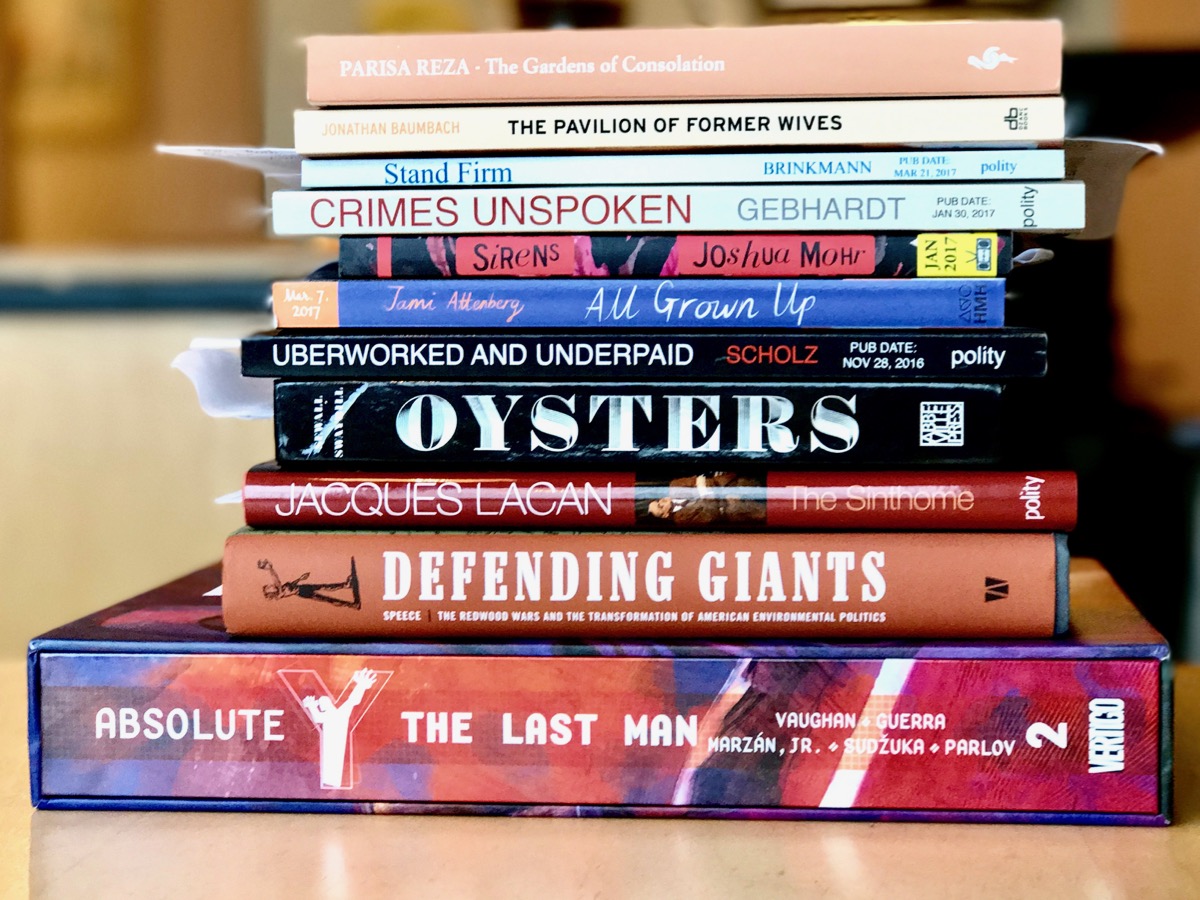The Sunday Post for November 13, 2016
A Time for Refusal
Well, I was going to go election-free today. I thought: "wouldn't it be nice to read around the thing, to not have to face it every moment. Why can't we have a Sunday morning without the election?"
I still think that's a fine goal, but to be honest, the best things published this week are about the election. Everybody is thinking about the election. Everybody is writing about the election.
So, let us go there, too, not with panic, but with a desire to learn and understand.
And who better to start with then one of our most prescient and thoughtful writers, Teju Cole, who published this in the New York Times Magazine.
It is a Sunday afternoon in a provincial town in France. Two men meet at a cafe. One of them, Berenger, is half-drunk. He is being berated by his companion, Jean. All of the sudden, they hear a great noise. When they and other townspeople crane their necks to figure out what’s going on, they see a large animal thundering down one of the streets, stamping and snorting all the way. A rhinoceros! Not long after, there’s another. They are startled. It’s outrageous. Something must be done. What they begin to do is argue heatedly about whether the second rhino was the first one going past a second time or a different one, and then about whether the rhinos are African or Asiatic.
Revenge of the Forgotten Class
Alec MacGillis, in ProPublica, about those voters all politicians have overlooked, who broke for Trump in a big way. By the way, ProPublica is an important institution, a non-profit news gathering organization. Consider tossing them a few dollars, if you can.
Hand-wringing among Democrats about the party’s declining support among white working-class voters goes back a long time, to Lyndon Johnson’s declaration that signing the Civil Rights Act would sacrifice the allegiance of white Southerners. Then came the rest of the historical litany: the crime wave, riots and anti-Vietnam War protests of the late 1960s, the consolidation of suburban white flight, Nixon’s Silent Majority, Reagan Democrats, NAFTA, gun control, the War on Coal, and on and on. By this year, many liberals had gotten so fed up with hearing about these woebegone voters and all their political needs that they were openly declaring them a lost cause, motivated more by racial issues than economic anxiety, and declaring that the expanding Democratic coalition of racial and ethnic minorities and college-educated white voters obviated the need to cater to the white working class.
But this assessment suffered from a fatal overgeneralization. The “white working class” was a hugely broad category — as pollsters defined it, any white voter without a four-year college degree, roughly one-third of the electorate. Within that category were crucial distinctions, especially regional ones. Democrats in national elections had lost most white working-class voters in the Deep South — indeed, virtually all white voters there — a long time ago. They had in the past decade and a half seen much of Greater Appalachia, stretching from the Alleghenies to Arkansas, follow suit, to the point where West Virginia, one of just five states that Jimmy Carter won in 1980, went for Mitt Romney by 26 percentage points in 2012. It was hard to see how the Democrats were going to win back coal country like Logan County, W.V., which Bill Clinton won with 72 percent in 1996 but where Obama got only 29 percent in 2012.
The smug style in American liberalism
An older piece, by Emmett Rensin, in Vox about liberalism's attitude towards the world. It sure seems like a lot of people who voted for Trump complain about how poorly liberals think of them.
There is a smug style in American liberalism. It has been growing these past decades. It is a way of conducting politics, predicated on the belief that American life is not divided by moral difference or policy divergence — not really — but by the failure of half the country to know what's good for them.
How It Happened
Elizabeth Drew looks at how we could have all been so certain Hillary would win, and how we were all so shocked that she didn't.
In late September, I ran into Newt Gingrich and, out of curiosity, I asked him how he thought the election would turn out. “There’ll be a surge for Trump at the end,” he said. “There’s only so far that Hillary can go; too many people don’t like her.” I dismissed this as spin, forgetting that for all his erratic nature Gingrich is a bit of a visionary. Until it happened in 1994, no one outside his small circle believed that he could turn the House of Representatives—in Democratic hands for forty years—into a Republican bastion; hardly anyone took seriously the idea that Gingrich, the rowdy back-bencher, could become speaker. How deeply he believed what he told me about Trump’s chances, I didn’t and still don’t know, but I think my reaction suggests how a great many people thought about this election, up until Tuesday evening: no way it could happen. So it wouldn’t.
And finally, I am totally with Maris on this:
Leonard Cohen. All the cover versions of "Hallelujah" were bullshit.
— Maris Kreizman (@mariskreizman) November 11, 2016
But, after last night, I'm with her on this too:
Except maybe Kate McKinnon's?
— Maris Kreizman (@mariskreizman) November 13, 2016
Letters for Lucardo: An Erotic Graphic Novel - Kickstarter Fund Project #45
Every week, the Seattle Review of Books backs a Kickstarter, and writes up why we picked that particular project. Read more about the project here. Suggest a project by writing to kickstarter at this domain, or by using our contact form.
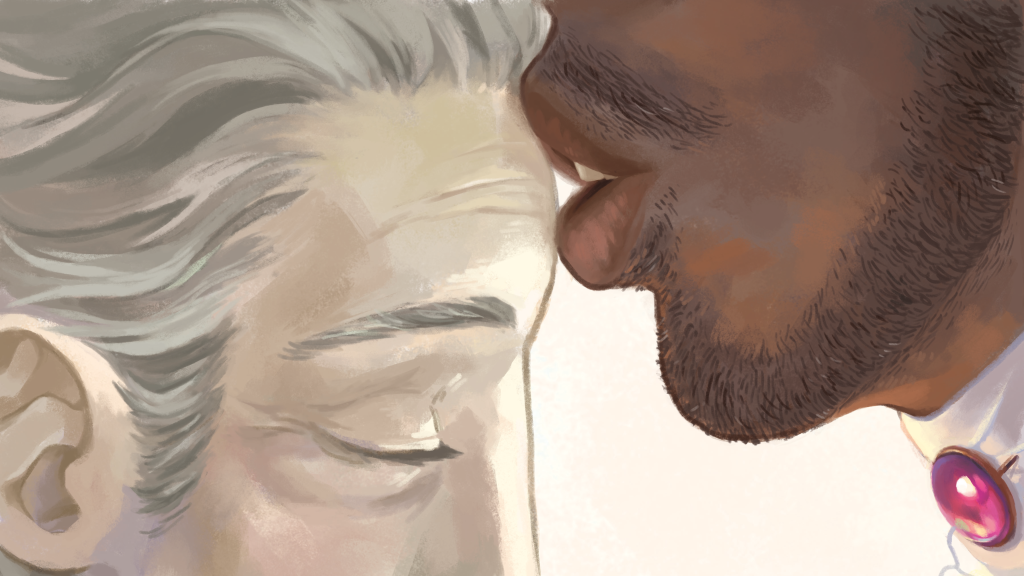
What's the project this week?
Letters for Lucardo: An Erotic Graphic Novel. We've put $20 in as a non-reward backer
Who is the Creator?
What do they have to say about the project?
When an aged mortal man and immortal vampire fall in love, painful realities about death—and the deathless—interfere.
What caught your eye?
Look, friends, this week it's really simple: not knowing what's coming with our country, backing an erotic queer story of interracial vampire-human romance seems downright political. I want publishers like Iron Circus (run by the kickass C. Spike Trotman, who flipped off the gatekeepers of the comics world, and built a thriving publishing house her own way) to have as much money as possible on hand for whatever may come under this coming administration.
Why should I back it?
First, Iron Circus puts out extremely high quality smut, filled with characters you'll love and stories that compel you to turn every page. There's a lot of sex, too, and romance. This isn't your old alt-press boner-fest comix from the sweaty back room for the horny fanboys; this is complex, real relationships in fantastical settings drawn by well-paid artists, written by amazing writers, with a focus on diversity of all kinds. It's the real deal.
Iron Spike does a lot of Kickstarters (this is number ten!). They know what they're doing, and they know how to deliver quality goods. Back this, give them some money, and let's get their coffers stuffed to the gills. Maybe they won't need lawyers in the upcoming administration, but being able to afford some will do wonders.
How's the project doing?
They're 212% funded. They don't need us, we need them.
Do they have a video?
Kickstarter Fund Stats
- Projects backed: 45
- Funds pledged: $900
- Funds collected: $700
- Unsuccessful pledges: 2
- Fund balance: $140
Now is when we need your novel
This is for you, NaNoWriMo writer, who just couldn't after this week. Who suddenly looked at your word count, and your plot, and came to find both hopeless. Who has been reading tweet-storms about every liberal nightmare, and how they will come to pass. Who looks at the other America, and wonders how they could vote for that man, who showed us exactly who he was, and what that person must think of you, and your friends, all of whom you are worried for?
I implore you to not give up. Work on your book, please. If you are the sort of writer who engages with the current world, then please do so bravely, and address the things you see around you; present the world as you know it.
If your work is escape from the real world, then please double-down. We need your entertaining stories so that we're not obsessing over the news all the time. Being distracted is not only mentally healthy, it's mentally necessary in times of great stress. The best thing? Everybody processes differently. Some turn to romance, some to horror, some to sparse stark stories about small town life. Whatever you love, write it.
Last year, I wrote a series of pep talks over six weeks for NaNoWriMo writers. I offer them here in hopes they will reengage you — and if you are stubborn and have kept up, good for you! Maybe in them you'll find something to move you past a hard spot.
Remember: your novel may not turn out great, but if it turns out, you'll have a first draft. As Maria Semple likes to say, you can start editing a bad draft; you can't make better a work that doesn't yet exist. Godspeed. We need you.
NaNoWriMo ADVICE COLUMNS
The Help Desk: As a writer, how do I get into another person's head?
Every Friday, Cienna Madrid offers solutions to life’s most vexing literary problems. Do you need a book recommendation to send your worst cousin on her birthday? Is it okay to read erotica on public transit? Cienna can help. Send your questions to advice@seattlereviewofbooks.com.
Dear Cienna,
I've done NaNoWriMo a few times and I have this one problem: My characters always turn out to be me, and it's boring the shit out of me. Last year, I tried to make the main character do some fun stuff: get into bar fights, go on a trip to the Middle East — I even tried to make him an undercover spy. But in the end, he snapped back to the same boring guy working at the same boring office. Why can't I engage my imagination? Am I cursed to always write what I know? Should I give up fiction forever?
Jeff, Magnuson Park
Dear Jeff,
You are in luck, as this is the perfect week to begin practicing escapism, much like my spiders do every time I try to contain their orgies to shoe boxes. Reading and writing are excellent ways to help people forget, however briefly, the practical (or carnivalesque) horrors of their daily lives.
You want to know how to write about someone other than yourself. I have two exercises for you:
1) Swap the gender of your main character – make her a woman, or LGBTQ, basically any type of person on the sexual or gender rainbow other than yourself. Instead of making your novel plot-driven, make it character driven. Explore how the world you've created perceives your character, how they navigate that world, how they interact with other characters you've created. (Tom Wolfe did this with the 2004 novel I Am Charlotte Simmons, which I personally thought was dull but other people went crazy for. I am confident you can do better than Tom Wolfe.)
2) Think of someone you personally know whom you actively dislike. Make them your main character, and, like the previous exercise, make your novel character driven as opposed to plot driven.
Both of these writing prompts are exercises in empathy. The best writing helps readers relate on some level to characters they don't understand or are even repulsed by. If you want your writing to resonate with an audience – or if you simply want to stop boring yourself – challenge yourself by writing about people and situations that make you uncomfortable.
Kisses,
Cienna
From the New York Times review of Settle for More, the memoir from Fox News host Megyn Kelly:
Ms. Kelly writes that her problems started in August, the Monday before the first Republican presidential primary debate. She had just done a segment on her show, “The Kelly File,” that infuriated Mr. Trump. He refused to make his own scheduled appearance on her show unless she phoned him personally.
“I almost unleashed my beautiful Twitter account against you,” she says he told her, “and I still may.”
Then, the day before the first presidential debate, Mr. Trump was in a lather again, Ms. Kelly writes. He called Fox executives, saying he’d heard that her first question “was a very pointed question directed at him.” This disconcerted her, because it was true: It was about his history of using disparaging language about women.
She doesn’t speculate where the leak came from. (She reports. You decide.) But that’s another unambiguous takeaway from this book: Parts of Fox — or at the very least, Roger Ailes, the network’s chairman until July, when he was given the boot after several allegations of sexual harassment were made against him — seemed to be nakedly colluding with the Republican presidential nominee.
And then, this:
Her story becomes more byzantine. On the day of the debate, Ms. Kelly writes, she woke up feeling great. Then an overzealous, suspiciously enthusiastic driver picked her up to take her to the convention center. He insisted on getting her coffee, though she’d repeatedly declined his offer. Once it was in her hand, she drank it. And within 15 minutes, she was violently ill, vomiting so uncontrollably that it was unclear if she’d be able to go on and help moderate that evening. It was so bad that she kept a trash pail beneath her desk throughout the debate, just in case.
Ms. Kelly never says outright that someone tried to poison her. (A stomach bug was going around, she notes.) But the episode spooked her enough that she shared it later with Roger Ailes and a lawyer friend of his. Foul play? Again: She reports. You decide.
I love books. I think there should be more books in the world. But call me crazy: this doesn't seem like the kind of material you should save for a memoir, does it? Seems like the kind of thing you might want to mention on, oh, say, your television show before, say, a national election happens?
Portrait Gallery: Donna Miscolta
Each week, Christine Marie Larsen creates a new portrait of an author for us. Have any favorites you’d love to see immortalized? Let us know
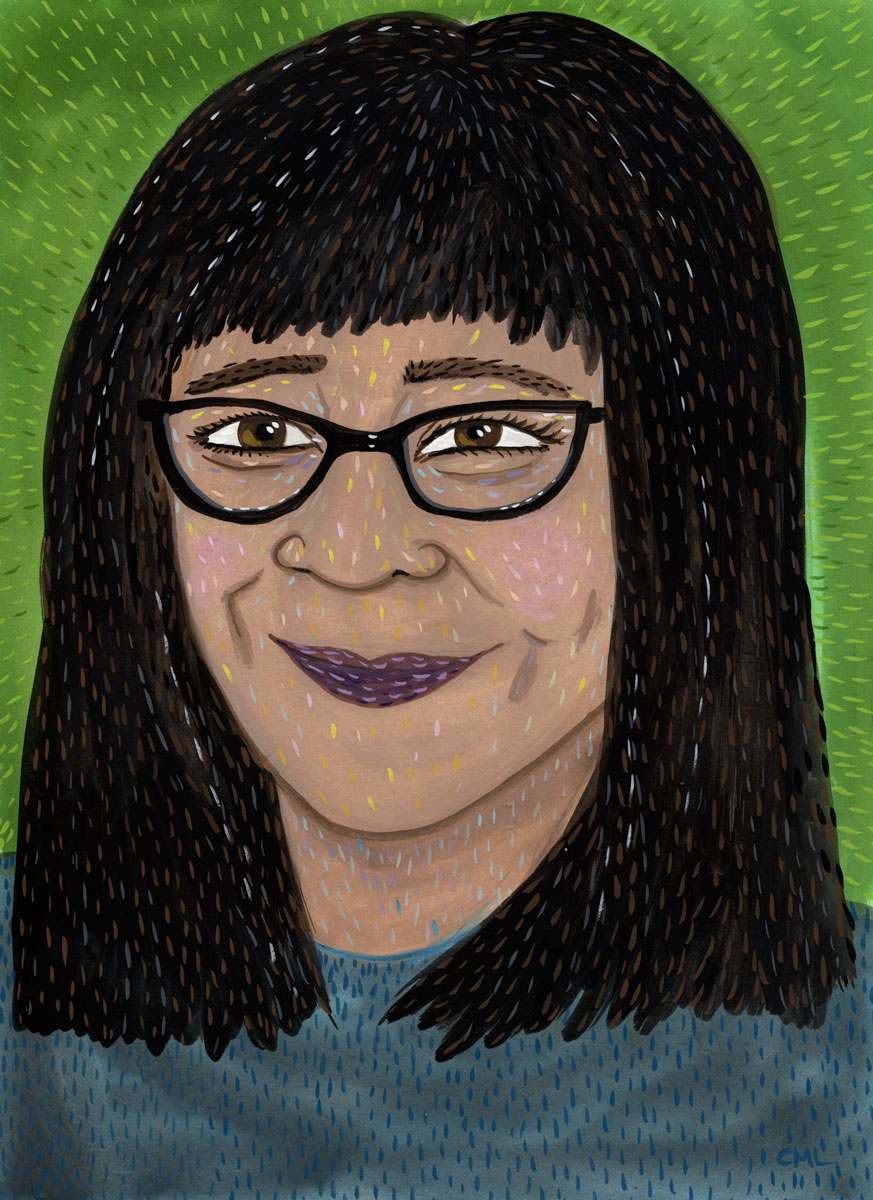
Saturday November 12th:
Hola and Goodbye Book Launch Party
Seattle author Donna Miscolta launches her new collection of short stories, which charts the progress of a Latinx family across three generations. In a time when the Republican Party is trying as hard as they can to demonize immigrants, this book celebrates the immigrant experience. This publication party features music from Acustico Perfecto.
Elliott Bay Book Company, 1521 10th Ave, 624-6600, http://elliottbaybook.com . Free. All ages. 7 p.m.
Get painted by Christine!
Christine is taking on a limited amount of commissioned portraits, in her Seattle Review of Books style, in advance of the holidays. If you want a portrait of a friend, loved one, pet, or even yourself (immortalize your bossest selfie!) for your own wall, or as the most thoughtful gift you can possibly imagine, then please do reach out. There's more information on her website.
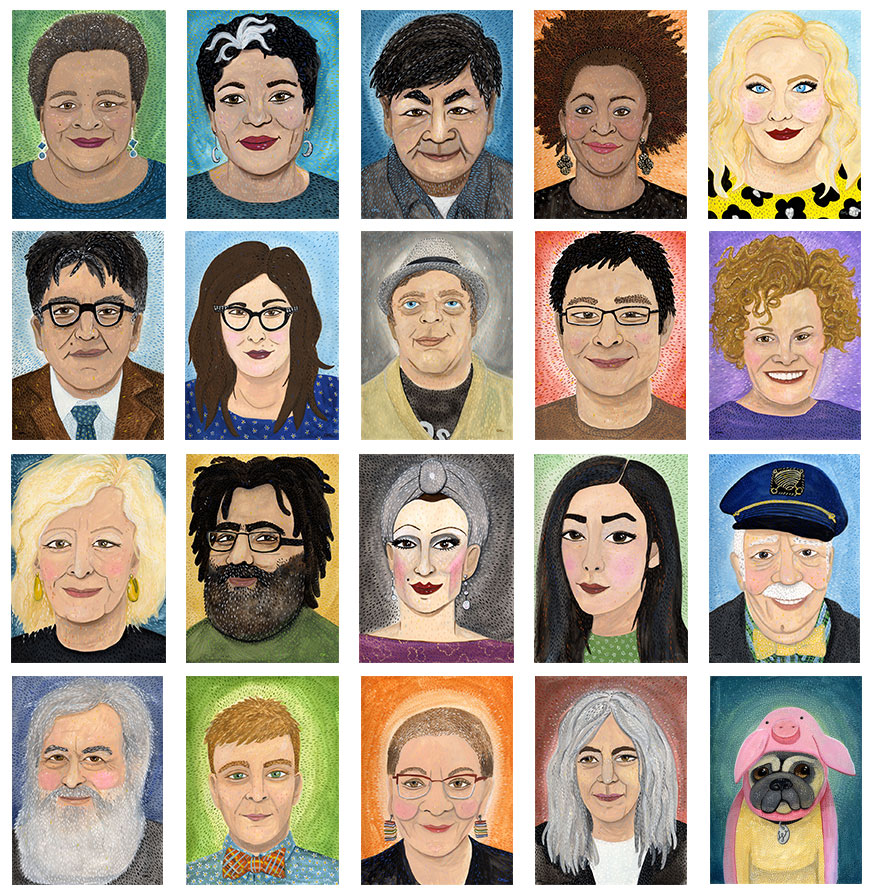
Another take on Short Run

Short Run Comix & Arts Festival was packed this year. There were quite a few booths I had to skip because of people eagerly blocking them. This is good — I was there a few hours after opening, and more than one artist I talked to spoke about being sold out of some items.
My favorite from last year, Laura Knetzger was back with a few new issues of her delightful comic Bug Boys. One of the stories, Issue Thirteen, was a kind of inner-journey psychedelic bug nightmare. It was a dark-night of the bug soul and a kind of peyote journey in the bug desert. In Issue Fourteen, Stag-B and Rhino-B accompany their friend the Bee Queen on a journey. Kntezger loves to put her bugs in underground contained architecture, placing them in situations of awe and fear, and evoking their truest natures. I find her work a great balm of philosophical thoughtfulness, and I’m always pleasantly surprised when her little heroes stumble on a new adventure.
Like Paul (our time at the festival overlapped, but we didn't see each other), I picked up Coyote and Butterfly Woman from Noel Franklin and Anne Bean, and appreciated its modern retelling of an old legend, especially for its Seattle setting, its tragic explanation of masculinity sadly pertinent this very week.
Hatem Imam, from Beirut, had a few interesting pieces in his booth. I picked up The Passing, a four-part story told largely in engravings and minimal text. The cover of each book was an intaglio copper-plate etching from the last story in the book, a nice tactile treat, and a very sober, serious presentation.
I said hi to Aaron Bagley, and picked up a set of small comics that he produced with his wife Jessixa Bagley, telling fictionalized mythologies centered on his parents house in Utah. I also bought one of his hand-illustrated greeting cards, a cat in a polka dot dress taking a picture of her spaghetti and meatballs dinner. (Secret about Aaron: he has a vast knowledge of outsider metal. If you like the heavy stuff, he always has good tips for obscure Japanese drone bands.)
I picked up the Colleen Frakes The Saint’s Eyes, fairy-tail(ish) shorts that were clever, often with fun or funny little twists at the end, and looked through her NaNoDrawMo book as well, which was interesting and fun and now I wish I had picked it up as well.
Emily Eagle had a great table, with many little projects, and a big print in simple blue hand-done type that read “this means your heart works”. I picked up her Giant Feelings, which is also her URL, and kind of perfect.
I walked away with (I paid, I promise!) a copy of RSVP by Gabrielle Bates and Catherine Bresner, what they call a “Poetry comic collaboration”, and that’s true. The art is primarily collage, and echoes some kind of Americana DNA that it was good to see conjured for uses of art.
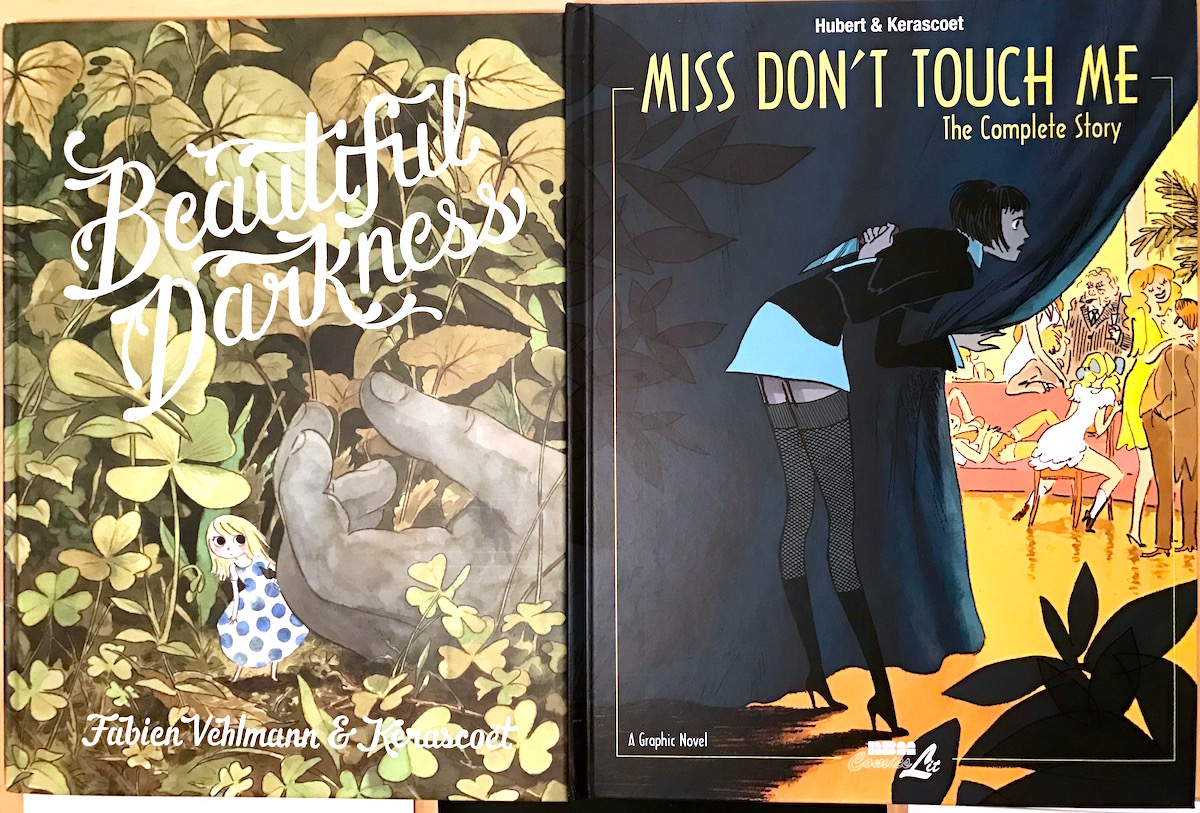
Probably my favorite pieces I bought this year were from French artist Kerascoët, which is the pen name of married couple Marie Pommepuy and Sébastien Cosset, who manned the booth together. I sought them out after the recommendation from a friend, and I’m glad I did. Miss Don't Touch Me is a story set in the 1930s, a woman investigating a murder of someone close to her by joining a high-end Paris brothel as a never-to-be-touched dominatrix. The other, the Eisner nominated Beautiful Darkness, starts with fairy-like creatures emerging from the corpse of a dead girl in the woods, a horror countered by the cuteness of the characters.
When I first came to their table, the man in front of me, blood draining from his face, said "Wait, you're her…them? I'm a huge fan!" It was as if he had just met a Hollywood star. Marie took the time to draw beautiful inscriptions on both his — and my — books, which was worth waiting for. Crayon, pen, and characters, an artist drawing something for you right there at the table. Isn’t that what it’s all about?
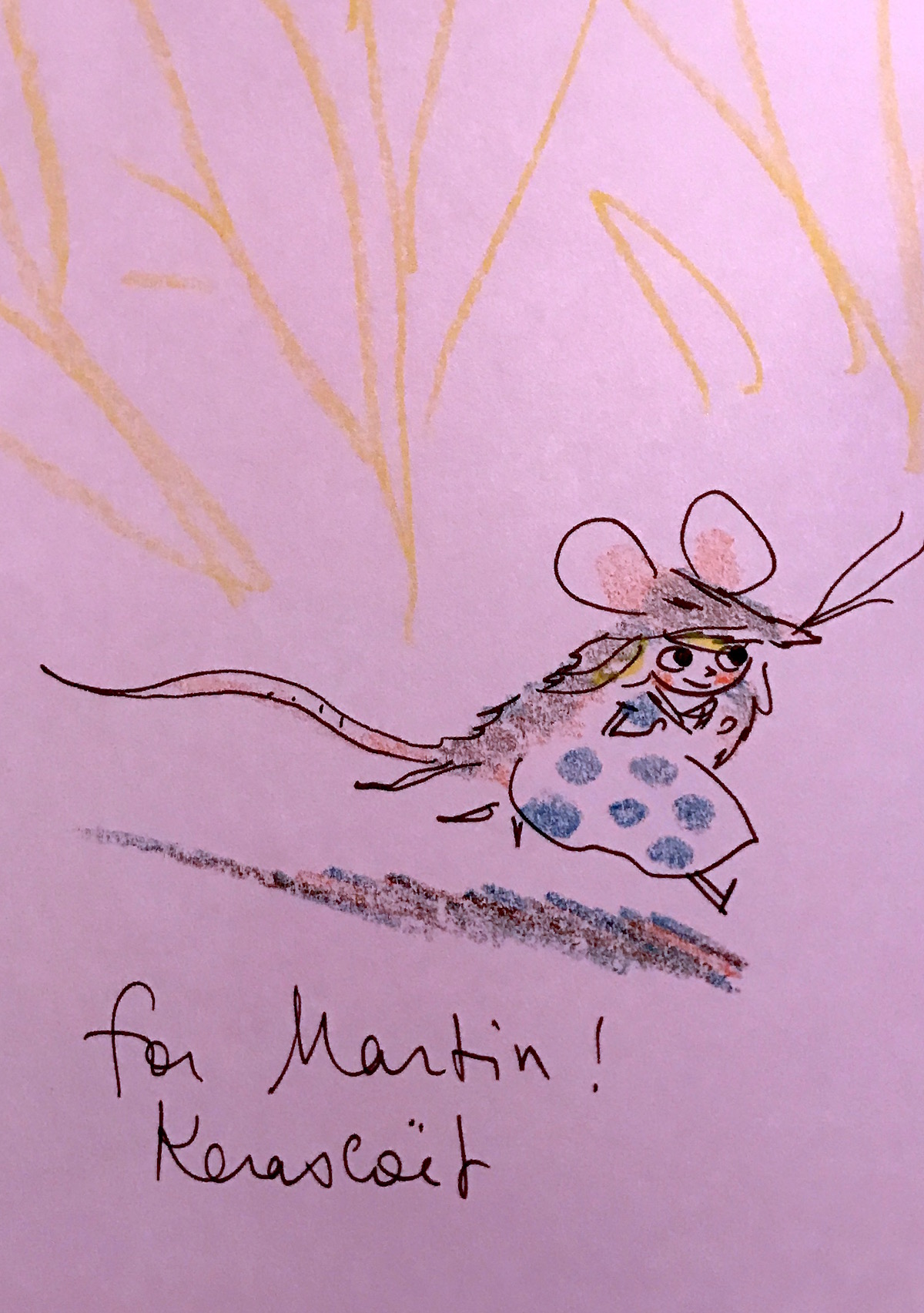
Thursday Comics Hangover: The best of Short Run 2016
Pre-election anxiety kept me from enjoying my Short Run Comix & Arts Festival to its fullest on Saturday. Last year, I wandered the floor for hours and talked to dozens of people. This year, I could only hang on the sidelines before diving into an aisle for a few minutes and then, overwhelmed by the crowds, retreating again. (Luckily, thousands of people were there to pick up my slack: it seemed as though there were even more attendees at this year’s Short Run than at last year’s, and social media seems to indicate that most of Short Run’s artists sold more books than any other year of the festival.) Because of my inability to mingle for very long, I came away from the festival with a very small stack of local comics. But it was one of the most satisfying hauls I’ve pulled away from any Seattle-area convention.

Frequent collaborators Greg Stump and David Lasky each brought new work to the show. Stump was selling a collection of The Group, his 2001 and 2002 comic strip from The Stranger (“back when they had two whole pages of cartoons an issue,” someone grumbled.) The Group is the story of an unlikely team of heroes — an astronaut, a ninja, a dog, and Piece of Bread, a sentient piece of bread — who fight various challenges to world peace, including a devious plot to build a giant cowboy hat on top of the world. Piece of Bread makes some protest signs to stop that plan — “NO HAT” and “STOP THIS LUNACY” and “HAT PLAN SUCKS” — but the rest of the team is reconsidering their options. “Sure, we had our doubts at first,” the ninja explains, “but now I think I’m kinda pro-giant-hat-on-the-earth.” These are good, absurdist gag strips that had nearly been lost to the mists of history; seeing them again after 15 years was an absolute delight.
Lasky’s newest book, I am from the Future, collects every poem Lasky wrote in April of 2016 — one poem each day. As a poet, Lasky is expanding and finding his voice. He writes about cosplayers at Emerald City Comicon, buses that never show up, and confusing Facebook algorithms. Some of the poems in Future are comics, and others are presented in text. It’s the comics poems that really stand out, particularly the one on the back cover about the lines in his comics disappearing, leaving just “The colors in between” — floating pools of color with no borders to keep them separated from each other. The text and images work perfectly together to create a metaphor that could not exist solely in either words or pictures.
The second issue of Punch to Kill, by Kevin Clarke, Wil Long, and Marc Palm, improves on the over-the-top action of the first by introducing gaudy superheroics to the equation. While Punch to Kill is, appropriately, one long fight scene, the transition from the kung fu movie of the first issue to the 1980s-style comics riff of the second adds even more enthusiasm. There’s not really a plot in Punch to Kill — in this issue, a cloaked figure fights a quartet of thinly veiled Marvel characters — but the plotlessness, in a judo-flip kind of way, becomes the plot. It’s all giddy and gorgeous and packed with good jokes, like a superhero named Blastress and a punching sound effect that reads “TOUGH BREAK.”
And speaking of exuberance, two books from Mita Mahato’s table demonstrated a very different kind of excitement. Her latest solo book, Patterns, is a collage of comics characters (an elephant-headed girl, a spoon-headed figure with a pizza cutter sticking out of the bottom of her purple dress) failing to communicate. “Repeat after me,” a horse-headed girl tells a man in a pleated dress, who responds, “after me.” It’s part vaudeville, part demonstration of how hard it is to really talk and listen, and it’s entirely beautiful.
But maybe the star of the whole convention for me was Forty Two, an anthology comic by Mahato, Emilie Bess, and Short Run cofounder Kelly Froh. Forty Two is a collection of short pieces about becoming middle-aged women — there’s a lot of accidental urination involved, and also some weird body hair. Mahato reflects on how difficult it is to be a woman of color “watching brown people on TV growing up” — mostly stereotypes like Tattoo from Fantasy Island — and recalling some of the terrible things people have said to and about her, including “You’re not the kind of diversity people are interested in,” and “Mommy why is she so dark?” Each of the pages in this fanzine-style collection reveals something new about the act of growing older as a woman, and the three cartoonists goad each other into having a lot of fun. Forty Two seems to me to be the perfect use of the zine medium: it feels like a personal document, like a handwritten letter. It’s so confessional, and so fun, and so celebratory, that it can pick a reader up even when it feels as though the world is burning down. These are all voices that deserve your attention.
Or you might want to go see Priscilla Long on Thursday...

Paul has recommended you go see Steven Barker on Thursday night at Hugo House. While I think that's a great option, I wanted to also recommend an alternative: Priscilla Long at the Elliott Bay Book Company.
Long has two newly released books: Minding The Muse: a Handbook for Painters, Composers, Writers, and Other Creators (reviewed today by Bonnie J Rough), and Fire and Stone: Where Do We Come From? What Are We? Where Are We Going?, a book of essays.
She's a local poet (we ran one by her a few months ago) teacher, and long-time friend to writers (The Writer's Portable Mentor, from 2010, is a particular favorite of mine). Her background exploring the history of creativity, art, and expressions of everything from joy to grief will no doubt make interesting conversation in our current climate.
Elliott Bay Book Company, 1521 10th Ave, 624-6600. Free. All ages. 7 p.m.
Your Week in Readings: The best literary events from November 9th - November 15th
Wednesday November 9th: Sacred Breath
This is the first in a new quarterly storytelling series by UW’s Department of American Indian Studies featuring (mostly local) indigenous poets, spoken word storytellers, and other assorted kinds of writers. The featured authors for the inaugural edition are Payton Bordley, Sasha LaPointe, and Roger Fernandes. UW Intellectual House, 4249 Whitman Court, University of Washington Campus, https://ais.washington.edu/. Free. All ages. 7 p.m.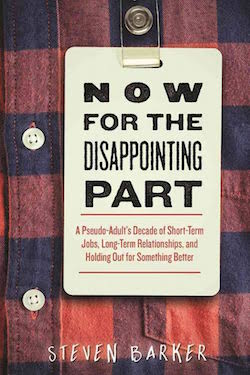
Thursday November 10th: Now for the Disappointing Part Book Launch
Seattle writer Steven Barker made a big splash in 2013 with a GeekWire piece titled “An open letter to Jeff Bezos: A contract worker’s take on Amazon.com.” Tonight, he launches a whole book about life in the contract-work economy, subtitled A Pseudo-Adult’s Decade of Short-Term Jobs, Long-Term Relationships, and Holding Out for Something Better. Hugo House, 1021 Columbia St., 322-7030, hugohouse.org.. Free. All ages. 7 p.m.Friday November 11th: The *Seattle Review of Books Presents Sherman Alexie, Robert Lashley, and EJ Koh
See our Literary Event of the Week Column for more details. Elliott Bay Book Company, 1521 10th Ave, 624-6600, http://elliottbaybook.com . Free. All ages. 7 p.m.Alternate Friday November 11th: Red Badge Project's Women Veteran Reading
Because the Seattle Review of Books is co-producing the previous event at Elliott Bay Book Company, we'd like to provide an alternate, conflict-of-interest-free event for you to consider. And this looks like a great cause: Seattle authors Suzanne Morrison and Sonya Lea present a reading from their Red Badge Project, which invites an audience "to hear the stories of women veterans in this remarkable evening to honor their service, on Veteran's Day." Frye Art Museum, 704 Terry Ave., http://https://www.facebook.com/events/1808684429377526/, 7 p.m., all ages, free.Saturday November 12th: Hola and Goodbye Book Launch Party
Seattle author Donna Miscolta launches her new collection of short stories, which charts the progress of a Latinx family across three generations. In a time when the Republican Party is trying as hard as they can to demonize immigrants, this book celebrates the immigrant experience. This publication party features music from Acustico Perfecto. Elliott Bay Book Company, 1521 10th Ave, 624-6600, http://elliottbaybook.com . Free. All ages. 7 p.m.Sunday November 13th: Book Launch Times Two
It’s a week to launch books into the world, apparently. This evening, Open Books is host to two book launches at once: Ellen Welcker presents her newest poetry collection Ram Hands and Tim Greenup’s new book of poetry is titled Without Warning. Greenup writes poetry about corn mazes and wild animals. Welcker writes poems about babies and “butt holders.” Open Books, 2414 N. 45th St., 633-0811, openpoetrybooks.com. Free. All ages. 7 p.m.Monday November 14th: Mapping the Heavens Reading
Priyamvada Natarajans is an astrophysicist. Her new book aims to make sense out of the mysteries of the cosmos. Mapping the Heavens explains dark matter, black holes, and the expansion of the universe. If it helps, think of it as astrology, only it’s actually based in facts and it can’t help predict if you’re getting laid this weekend. Town Hall Seattle, 1119 8th Ave., 652-4255, townhallseattle.org. $5. All ages. 7:30 p.m.Tuesday November 15th: Future Sex Reading
Emily Witt’s new book examines modern sexuality, from online dating to changing opinions about polyamory. Future Sex is part memoir, part investigative journalism, part profile of sexual subcultures. And all together, those different narrative threads combine to form a portrait of what it means to be a sexual woman in the 21st century. Town Hall Seattle, 1119 8th Ave., 652-4255, townhallseattle.org. $5. All ages. 7:30 p.m.Help selfie
Published November 09, 2016, at 12:00pm
Helping herself when faced with self-help, Bonnie J Rough ends up helping us all.
Literary Event of the Week: Sherman Alexie, Robert Lashley, and EJ Koh
Sherman Alexie has had a hellacious couple of years. In the summer of 2015, his mother passed away. Their relationship was always contentious and complicated, and throughout the late summer and early fall Alexie wrote dozens of poems while trying to work through his complicated grief. In December of last year, a doctor informed Alexie that he immediately needed surgery to remove a noncancerous brain tumor. The nine-hour procedure was wildly successful, but still terrifying as fuck the whole way through — afterwards, Alexie was in the ICU for a day and in the hospital for a week before beginning a long recovery regimen at home.
The year has not been all bad. As soon as he was physically able to write again, Alexie spent his post-surgery recovery period working on a memoir which incorporated that flurry of poems about his mother and new pieces about his troubled brain. And this fall, as he’s handed his upcoming memoir off to his publisher, Alexie has been everywhere around town, working so much that it seems as though he’s making up for lost time: interviewing celebrity authors like Bryan Cranston and Mary-Louise Parker, doing events with writer friends like Jess Walter and Tim Egan, and promoting the work of young writers.
This year, Bumbershoot asked the Seattle Review of Books to present a reading program, and so we thought we’d pair Alexie with two of the region’s best up-and-coming young writers: Bellingham poet and spoken word performer Robert Lashley, author of The Homeboy Songs, and a poet named EJ Koh whose first book is to be published next year. The combination was so energetic it was practically radioactive: Lashley’s poem “Thirteen Ways of Looking at a Motherfucker at the Club” had the room vibrating with laughter, Koh’s poem about the 2014 South Korean ferry disaster led many to openly weep, and Alexie read work from his upcoming book that crossed from comedy to tragedy and back again.
Every writer, when they’re coming up against the end of the publication process, has to re-learn how to be a human. Alexie was at that point in the process at the time of the reading, and he was still coming to grips with his world turning inside out. After the reading, he was euphoric; you could tell that he had remembered why he had fallen in love with writing in the first place. It was his idea to bring the same lineup to Elliott Bay Book Company, to present the program to a wider audience. That reading happens this Friday at 7 pm, and—for those who couldn’t afford Bumbershoot tickets this year—it’s absolutely free.
Fans of Alexie’s writing will love Koh and Lashley: they share his bawdy sense of humor, his smart sense of play, and the scary raw emotion that make his readings so special. If you missed this event the first time around, you get another chance to make it right. Come help Alexie end this misbegotten year on a high note
I like to be in America
Published November 08, 2016, at 1:01pm
Donna Miscolta’s exquisite short stories about Mexican-American immigrants are the balm for our troubulent times.
Please, please vote today
Thanks to Seattle comics writer G. Willow Wilson for writing a Ms. Marvel panel that exactly sums up our feelings about the day:
Muslim female superhero leads followers to the polls pic.twitter.com/yRDX1Lb4pq
— Khaled Beydoun (@KhaledBeydoun) November 6, 2016
And thanks to the Drunk Booksellers podcast for this book display. Nasty women often make history:
Fucking vote, y'all. #nastywomen pic.twitter.com/5fWicsxuv7
— Drunk Booksellers (@drunkbookseller) November 7, 2016
Please go vote. Vote for what you think is right. And if you haven't dropped your ballot in the mail by the time you read this post, you should probably drop your ballot directly into a ballot box. Find those locations on the Secretary of State's website.
Allure
She was perfect pitcher,
Cooled glass and ice center,
Crystal all her own bounty:Solid hammer, extended bat broken
Cam, when is delicate fist
Worth more than peacock tailedBeauty fanned against face?
She is not safe.
No one is safe
From the break.Her grandmother was a witchdoctor
seafoam green eyes and muddy skin
the earth shook when she spokeislands out of the sea, a place called home.
She is not safe.
No one is safe
From the break.The sun perched between her thighs
A gown of silk and spit sways against
The winds exhale, she asks the skyTo return her purple labia in exchange
For the low hum she remembers rattled
At moon once the sun burned out, but nowAll she can hear is the whir and click of
Her unhinged ribs stringing themselves back
Together in the shape of an open mouth:she will devour each star until rendered black.
She is not safe.
No one is safe
From the break.Her daughter wears a crown around her neck
one lone dove in the palm of her hand
she names it after her father's fallen eyelash.A bundle of sage burns at her feet
smoke twists towards her gathered ten,
she stops listening to her mother chewing heatlong enough to catch the birds last breath.
A copper leash patterned after still
heart of her grandmother’s dust swingsin mimic of smoke, proven ancestry.
She is still not safe.
We are still not safe
From the ache.We form ourselves indigo diamonds
Anyway.
Wait...who was really funny? Really?
Our thanks to sponsor Atelier26 for bringing the astounding book Funny-Ass Thoreau to our readers this week. The book, released officially on Tuesday the 8th, covers a side of America's favorite recluse not seen in his more famous writings.
There's a great sample on our sponsor's page, so we can back up this astounding statement: Thoreau was, indeed, a very funny man. But don't take our word for it, check out the book, and be sure to click through and pick up a copy if you like what you read.
Do you want to be a sponsor, like the tremendous Atelier26? We have two openings in December, and one in January, before we're sold out of our current run. If you have something to advertise for the holidays, now is your time! Check out the available dates on our booking page, or more details here.
The smartest person in the voting booth
Published November 07, 2016, at 12:01pm
A new book makes a bold proposal: should we require voters to pass an intelligence test? What would that mean for democracy? And hey, when did we decide that democracy was the only way to run a government, anyway?
Elliott Bay Book Company is our November Bookstore of the Month
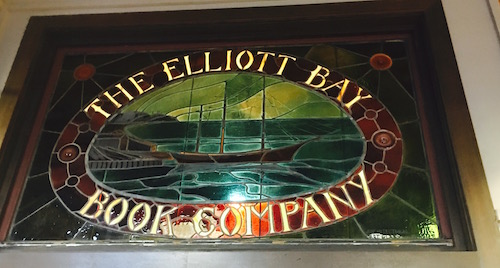
Elliott Bay Book Company is not the city’s oldest bookstore — University Book Store is older, by over a half-century — but it is arguably our most iconic. Founded in 1973, Elliott Bay has changed ownership three times. The shop was founded and expanded in its original Pioneer Square location by Walter and Maggie Carr. When the Carrs retired, they sold the shop to Third Place Books owner Ron Sher in 1999. Third Place partner Peter Aaron bought the bookstore from Sher a few years later, making it fully independent once more.
In 2010, after a long decline in sales, the store moved from its original location to a Ford truck repair shop on Capitol Hill. Though many in Seattle lamented the loss of the old, sprawling space — the store had expanded outward through the years, taking up other storefronts on the same block and creating a unique, rambling feel — Aaron and Elliott Bay manager Tracy Taylor went to great lengths to make the transition as familiar as possible. The old handmade cedar bookshelves from the Pioneer Square store were dismantled and reassembled in the new space, retaining an important continuity in the visual language of the store. In the years since the move, Elliott Bay has enjoyed some of its most profitable years in the history of the business. Foot traffic on Capitol Hill has significantly shaped Elliott Bay’s new direction: the kids’ section, for instance, expanded hugely thanks to the influx of young parents visiting in the first few months after the move.
If you were to combine the experience of senior Elliott Bay staff, you’d quickly tally up a few centuries of bookselling. Elliott Bay has always celebrated its talented booksellers through an enormous Staff Recommends wall, an extensive book club program, and the staff-written Booknotes newspaper. It has gained a reputation for training some of the best booksellers in the business.
The thing that makes Elliott Bay such a nationally recognized institution, though, is the reading series. University Book Store and Third Place Books both have robust readings schedules but Elliott Bay hosts an average of more than one event for every single day of the year, and has kept up this demanding schedule for decades. Big-name authors who have appeared at Elliott Bay events include Haruki Murakami, Salman Rushdie (making a rare appearance at the heat of the fatwa that kept him in hiding), Joan Didion, Bill Clinton, and Barack Obama. But Elliott Bay has also shepherded authors from the very beginning of their careers, promoting their books with events when no other bookstore would.
In the next few weeks, we’re going to talk with booksellers about what makes Elliott Bay so special and what’s in store for the future of the bookstore. And I hope you’ll join the Seattle Review of Books for a special free reading at Elliott Bay this Friday, when Sherman Alexie — himself an author who has been reading at Elliott Bay since before he was, well, Sherman Alexie — presents Robert Lashley and EJ Koh, two writers who will no doubt be reading at Elliott Bay for years to come.
This trailer for Where the House Was, a documentary about the Hugo House's birth, physical demolition, and spiritual legacy, is a terrific little movie in and of itself:
You can learn more about the film and follow its progress at teamdemohugo.com.
